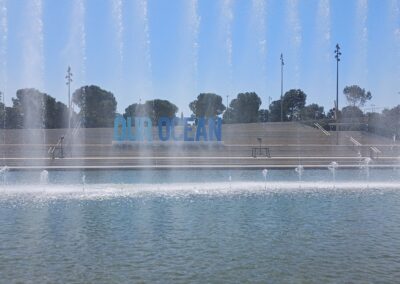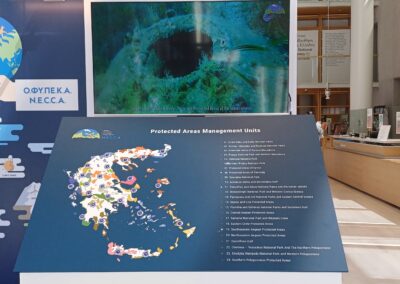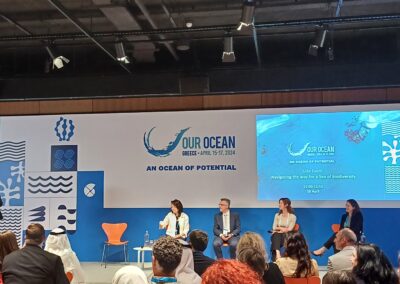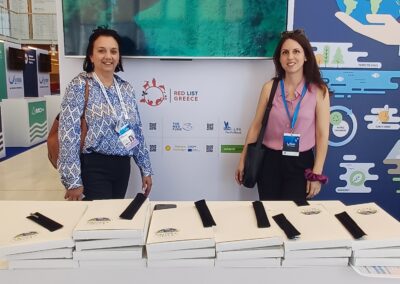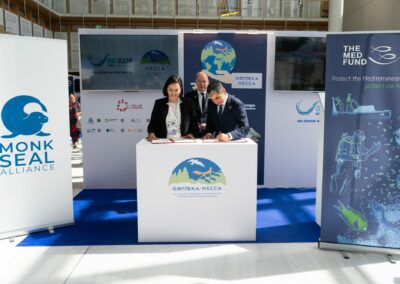The National Technical University of Athens (NTUA), partner of the Natural Heritage Mission, attended the international conference “Our Ocean 2024”, held between 15-17 April in Athens.
Our associated partner, Natural Environment & Climate Change Agency (NECCA), participated in the conference with a booth, where the Natural Heritage Mission was promoted among several other projects in which NECCA is involved. It is worth mentioning that among the visitors of the booth was Prince Albert of Monaco that was informed about the emblematic projects of NECCA (including the Natural Heritage Mission) and expressed his support for the work being implemented in the Med area.
NECCA also hosted an inspiring side event with the title “Navigating the way for a Sea of biodiversity”. During this side event, a diverse panel of exceptional professionals participated in an intriguing discussion addressing various aspects regarding the protection and restoration of our oceans.
Mercedes Muñoz Cañas – Dialogue4Nature partner IUCN-Med emphasized that ocean protection is a global issue and the Mediterranean Sea belongs to this global arena. Thus, global policies, such as the Global Biodiversity Framework or the High Seas Treaty, should be the starting point followed by sustainable planning on territorial and national level. Actions should range from strengthening the existing legal framework to successful solutions implementation.
Maria Damanaki – Independent Advisor on Climate-Oceans and EU Commissioner for Maritime & Fisheries (2010-2014) stated that the protection of oceans is a very complex issue involving a variety of activities and stakeholders. She also argued that there are different levels of protection for marine areas and the challenge is to make the protection really happen rather than just keeping the list of protected areas “on paper”. For this to happen, a concrete legal protocol is required, along with a successful planning and monitoring system. Finally, she referred to funding as a critical issue to be addressed and, from this point of view, alliances with the private sector are useful.
Manya Russo – Birdlife Malta gave the species protection perspective stressing out the heavy impact anthropogenic activities bring on biodiversity. It is always crucial to consider the socioeconomic factors when trying to protect the environment. That is why she underlined the need to break silos, collaborate and bring together the different stakeholders and involve local communities in this process.
Prof. Panagiotis Dimopoulos – University of Patras and Member of NECCA’s Board praised the substantial work performed at European and Mediterranean level, with the Natura 2000 and the national designations of protected areas. The 30×30 goal needs a lot of work to be achieved, considering that, despite the existing tools, more legally-established conservation measures are needed. NECCA will play an important role in this process in Greece utilizing its effective strategic plans and the good cooperation among its management units for protected areas.
Closing the event, the President of NECCA’s Board of Directors, Prof. Maria Papadopoulou, announced the foreseen implementation of new activities including a latest technology monitoring and surveillance system, conservation actions for marine habitats (including posidonia and pinna nobilis restoration), as well as the establishment of a marine biodiversity monitoring center in Alonissos area.
NTUA attended several side events held in the context of the conference, within its four focus areas:
- Sustainable Tourism in coastal areas and islands;
- Green Shipping;
- Plastic and Microplastic Pollution; and
- Green transition in the Mediterranean Sea.
Some of the important messages for the future of our ocean shared between participants were the following:
- We get scale to our actions only with efficient collaboration.
- We must enhance knowledge and skills, especially among young people.
- We shall understand the importance of oceans and their connection with the climate crisis.
- We shall always consider the socioeconomic factors and discuss solutions with communities, so that they can feel owners of the actions.
- We need more investments in science.
Another interesting remark during the conference was that the ocean reporting moves to the next level. It passes from ‘just numbers’ to ‘stories’; stories that should be shared with stakeholders and inspire change!
Last but not least, the Greek Prime Minister, Kyriakos Mitsotakis, announced several ambitious actions for the future of the Greek Seas. His commitments, with a total budget of 780 M Euros, include:
- The development of two marine parks in the Aegean and the Ionian Sea.
- The construction of charging infrastructure in 12 ports in the country to start the electrification of maritime transport.
- The ban on trawling in all protected areas by 2030.
- The implementation of sophisticated surveillance methods in protected areas and for monitoring marine pollution.
- The reduction by 2030 of 50% of plastic waste and 30% of microplastic waste compared to 2019.
This intense interest to deal with ocean protection and restoration, as highlighted in the conference, is directly linked with the vision of the Natural Heritage Mission to promote environmental conservation in the Euro-MED area and beyond. The Mission works on the Mediterranean Sea territory and its community engages a big number of actors dealing with the marine environment. It is thus our top priority to follow progress on this important issue and contribute with our activities to cleaner oceans.

